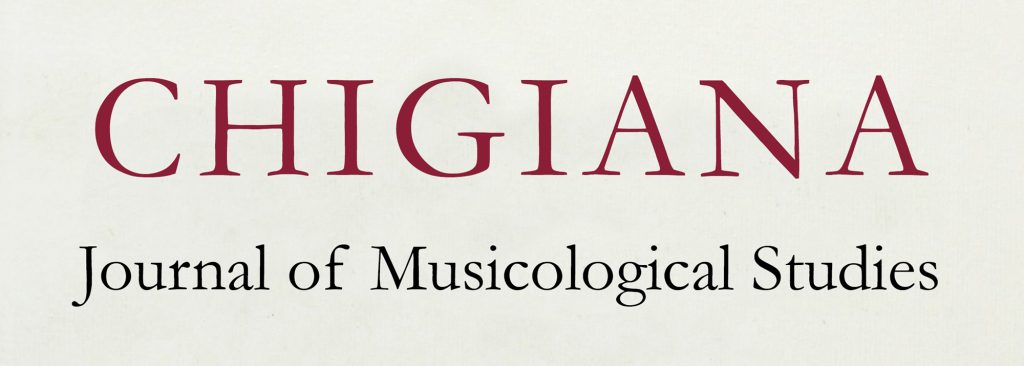
CHIGIANA CONFERENCE 2022
Music and the Spiritual since the French Revolution
CALL FOR PAPERS
Siena – Accademia Musicale Chigiana
1-3 December 2022
Following the French Revolution, as institutionalized religion generally declined in Europe and beyond, many artists turned away from rigid Christian dogma to explore horizons of spirituality aimed at enhancing the mystical component of religious experience. Works of art were seen as products of divine inspiration and music, in particular, as an object of spiritual reverence. Composers were viewed as inhabiting godly powers and listeners described music as an object of spiritual contemplation.
Around 1800, statements such as ‘Music can express … every degree of spirituality’ (A. W. Schlegel) and ‘[Music is the] highest mystery of … mysticism, religion fully revealed’ (W. H. Wackenroder) articulated the tenets of Kunstreligion, an aesthetic belief in art’s inherent divinity. Music, whether instrumental or vocal, sacred or secular, partook of ideas related to boundlessness and the absolute — that is, the very elements that make up the substance of established religion. In the words of E.T.A. Hoffmann, music’s ‘sole subject is the infinite’.
The last two centuries have seen many different redefinitions of aesthetic concepts binding non-dogmatic spirituality and sound. In the 19th century, the syncretic unity of text, music, and ritual in sacred art gradually weakened, leading to new relationships between aesthetic and religious elements. We find multiple examples of sacred elements in secularized forms and practices, such as allusions to religious or quasi-spiritual elements in secular music. The 20th century witnessed a significant decrease of sacred music dedicated to the rituals of an official religion, a trend that arguably continues today. However, like their nineteenth-century counterparts, many composers continued to forge close interactions with the sphere of spirituality, often concealing these references in the innermost layers of their openly secular and worldly poetic universes.
The musical outcomes of such complex, subtle engagements between the sacred and secular spheres, have yet to be fully explored. They invite questions about composers’ relationships with tradition and modernity, the idea of progress as a gradual approach towards perfection, the aesthetic tendency towards abstraction, the shaping of musical listening under specific aesthetic tenets, the search for new dimensions of musical temporality, the mixing of religiosity and processes involving national identity, etc.
Following these premises, the conference aims to explore the multiple paths – whether involving performance and listening practices or creative works – inspired by ideas of spirituality in 19th-, 20th and 21st-century music cultures.
While we welcome presentations on any musical genre, religion, ideology, and geographical region, the conference will focus on Western art music, broadly construed.
Possible topics for consideration include, but are not limited to, the following:
- religious elements in secular music (inclusion or allusion to)
- religion and listening practices
- spiritual soundscapes
- intimations of the sacred in the domestic sphere
- religion and devotion on the operatic stage
- non-liturgical instrumental music and faith experience
- the spiritual body: dance and the sacred
- the concert hall as sacred space
- reception of Medieval and Renaissance sacred music
- music and transcendence
- music, religion and politics
- music, religion and science
- music and conversion experience
- music as an expression of power
- spirituality in agnostic or atheist composers’ work
- music and spirituality in colonial contexts
- popular music styles in institutional worship
- musicians’ and audiences’ understandings of the sacred-secular symbiosis
The official languages of the conference are English and Italian. A selection of the conference papers will be published in the 2023 volume of Chigiana. Journal of Musicological Studies (https://journal.chigiana.org/).
Please send your proposal to chigiana.journal@chigiana.org by 30 December 2021.
Proposals should include:
– Title of paper
– Name of speaker(s)
– Speaker(s)’ institutional affiliation(s)
– A proposal of c. 300 words in Word document
Scientific Committee:
Philip V. Bohlman, Simone Caputo, Mila De Santis, Roe-Min Kok, Eftychia Papanikolaou, Susanna Pasticci, Andrew Shenton, George S. Williamson.
Organising Committee:
Antonio Artese, Stefano Jacoviello, Anna Passarini, Nicola Sani, Samantha Stout.
